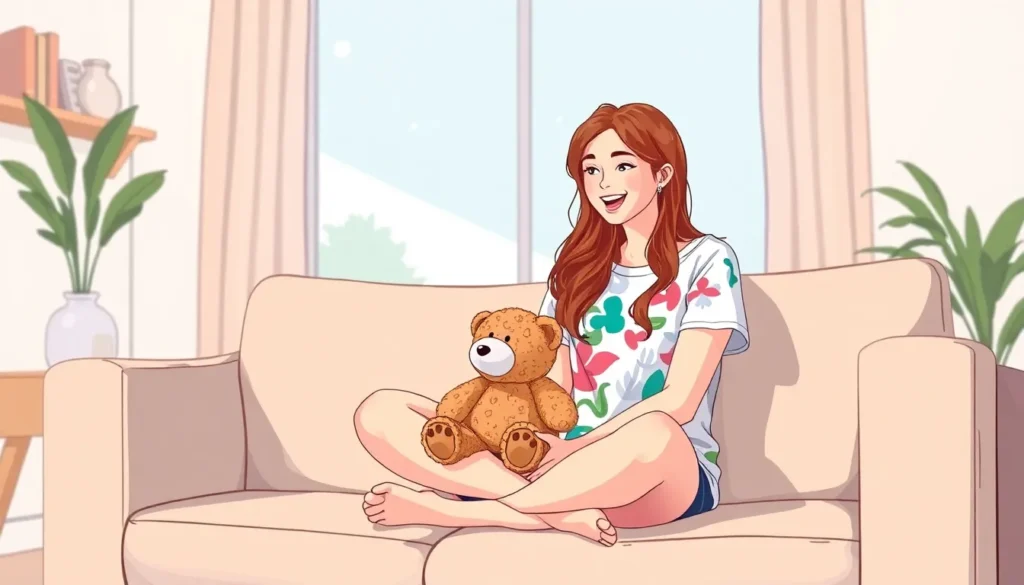Everyone has those quirks that make them unique, but some habits are downright bizarre. From counting steps to eating dessert before dinner, these weird habits reveal a lot about human nature. They can be endearing, perplexing, or just plain funny.
Imagine a world where the oddities of daily life become the centerpiece of conversation. Embracing these peculiarities not only adds a dash of humor to our routines but also helps us connect with others. After all, who hasn’t chuckled at a friend’s strange ritual or cringed at their own?
weird habits
Weird habits encompass a wide range of behaviors that often defy societal norms. These quirks can include anything from unusual eating preferences to peculiar routines. Engaging in such habits adds a unique flair to personality and fosters memorable interactions.
Many individuals instinctively display their odd habits in daily life. Biting fingernails, tapping feet, or talking to inanimate objects often falls under this category. These actions, while seemingly trivial, reveal intriguing aspects of a person’s character.
Interestingly, weird habits can provoke laughter and create relatable moments among peers. People frequently bond over shared experiences involving their eccentricities. For example, two friends may find amusement in discussing their compulsive tendencies, such as rearranging items or checking locks multiple times.
Moreover, certain habits serve as coping mechanisms for stress or anxiety. Comforting actions, like doodling or fidgeting, help individuals navigate challenging situations. Even though these habits may appear strange to outsiders, they often provide solace and grounding.
Ultimately, embracing weird habits enriches social interactions. Celebrating these quirks allows people to connect on a deeper level. Recognizing the beauty in oddities may lead to more genuine relationships, as individuals share their stories and experiences.
Psychological Insights

Weird habits often reveal underlying psychological factors. Understanding these aspects offers a closer look at human behavior.
The Science Behind Habits
Research indicates that habits form through a three-step process: cue, routine, and reward. A cue triggers a response, prompting an action or routine. This action typically offers a reward, reinforcing the behavior. In this cycle, dopamine plays a significant role. Dopamine surges during enjoyable experiences, motivating individuals to repeat behaviors associated with pleasure. Consequently, quirky behaviors might serve as pathways to positive emotional states. Studies have shown that around 40% of daily actions are habitual, emphasizing how integral these patterns remain in life and decision-making.
Why We Develop Weird Habits
Individuals develop weird habits for various reasons. One primary factor is stress relief. Unusual behaviors, such as fidgeting or pacing, often provide comfort amid anxiety or uncertainty. Repetitive actions can distract from negative thoughts, creating a sense of control. Additionally, social and environmental influences play a role. Exposure to specific behaviors in childhood may shape personal habits later in life. Social acceptance often encourages eccentricities, leading to the formation of communal quirks. Some people express individuality through peculiar actions, using them as symbols of uniqueness in social settings.
Common Examples of Weird Habits
Weird habits often manifest in various aspects of life. Quirky eating habits stand out as particularly fascinating.
Quirky Eating Habits
People display unique food preferences that defy conventional norms. Some individuals eat pizza with a fork and knife. Others mix sweet and savory dishes, like bacon and chocolate. Enjoying foods at a specific temperature, such as cold pizza or hot soda, adds to the peculiarity. Many also have rituals around mealtime, such as arranging food items on the plate or eating in a specific order. These behaviors may stem from personal backgrounds or serve as coping mechanisms. Sharing these unusual preferences often sparks lively conversations during gatherings.
Unusual Sleep Practices
Unusual sleep practices reveal another layer of weird habits. Some individuals prefer sleeping with multiple pillows while others require absolute darkness. Certain people find comfort in sleeping in unconventional positions, such as curled up like a fetus or sprawled out starfish-style. Others listen to white noise, rain sounds, or even specific podcasts to fall asleep. Deliberate practices like avoiding screens before bed can be common among those looking to improve sleep quality. By discussing these unique preferences, individuals can connect over shared experiences and discover new tips for better sleep.
Cultural Perspectives on Weird Habits
Cultural perspectives significantly influence the understanding of weird habits. These perspectives shape how societies define normality and eccentricity.
How Different Cultures Perceive Weirdness
Western cultures might label certain habits as quirky, while Eastern societies often appreciate them for their uniqueness. Acceptance varies; for instance, talking to inanimate objects is viewed as playful in some cultures and odd in others. Cultural context plays a crucial role, as what appears bizarre in one region may be regarded as customary in another. Understanding these differences fosters appreciation for global diversity in behavior.
Unique Habits Around the World
Individuals around the world exhibit a range of unique habits, each rooted in their cultural backgrounds. In Japan, slurping noodles signifies enjoyment, whereas in Italy, it may be frowned upon. Some cultures emphasize communal eating, with shared dishes fostering connections among people. In contrast, others celebrate individual servings that enhance personal preference. Recognizing these variations helps highlight the richness of human expression, showcasing how habits, perceived as weird in certain contexts, can also communicate deeper cultural values.
Coping with Weird Habits
Weird habits can challenge daily life, but addressing them can lead to improvement. Recognizing when a habit disrupts personal well-being signals the need for intervention. If a behavior triggers embarrassment, anxiety, or impairment in relationships, seeking professional help becomes vital. Therapists can provide strategies to identify root causes and develop healthier practices.
When to Seek Help
Understanding when to seek help for weird habits requires careful assessment. Noticeable distress caused by a habit can indicate a problem. Excessive eating behaviors or compulsive rituals often reflect deeper issues. When personal relationships suffer due to these tendencies, speaking with a mental health professional offers clarity. Consultation with a specialist helps individuals explore coping mechanisms tailored to their unique situations. Moreover, ongoing stress or anxiety linked to habits often necessitates guidance.
Strategies for Overcoming Unwanted Habits
Developing strategies for overcoming unwanted habits significantly enhances personal control. Identifying triggers marks the first step toward change. Keeping a journal to track occurrences helps raise awareness. Gradually substituting habits with healthier alternatives promotes positive transformation. Establishing achievable goals supports progress as well. Engaging friends or family for accountability enhances commitment. Lastly, practicing mindfulness fosters self-compassion during setbacks, allowing individuals to navigate the journey toward healthier behaviors.
Conclusion
Weird habits reveal the fascinating complexity of human behavior. They not only provide insight into individual personalities but also create opportunities for connection and laughter. Embracing these quirks can enhance social interactions and foster a sense of community among those who share similar eccentricities.
While some habits may serve as coping mechanisms, it’s essential to recognize when they become problematic. Seeking help when necessary can lead to healthier practices and improved well-being. Ultimately, understanding and accepting these unique traits enriches life, allowing individuals to express their true selves while appreciating the diverse tapestry of human experience.



